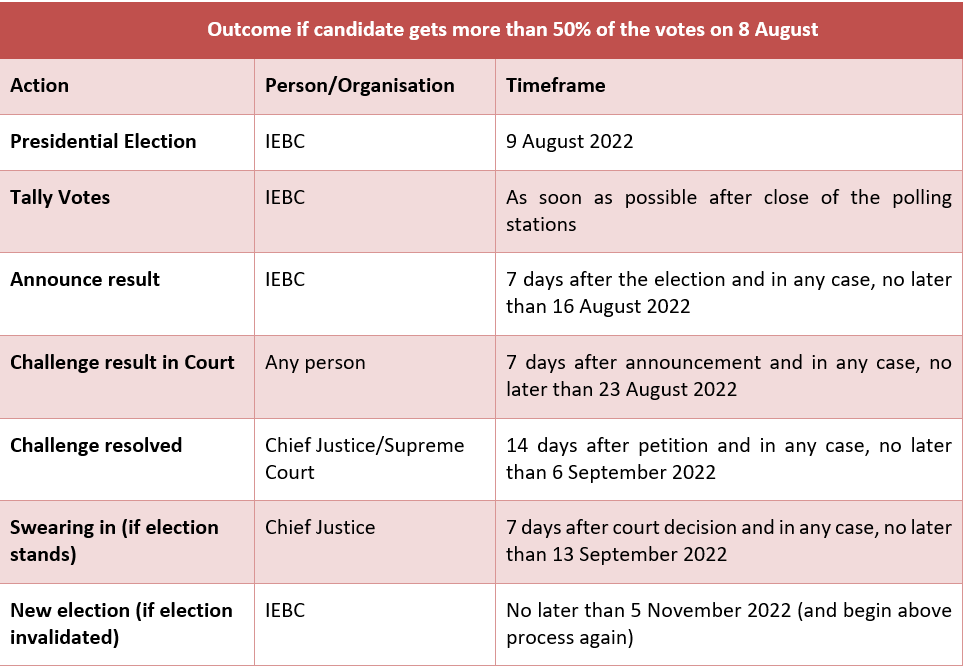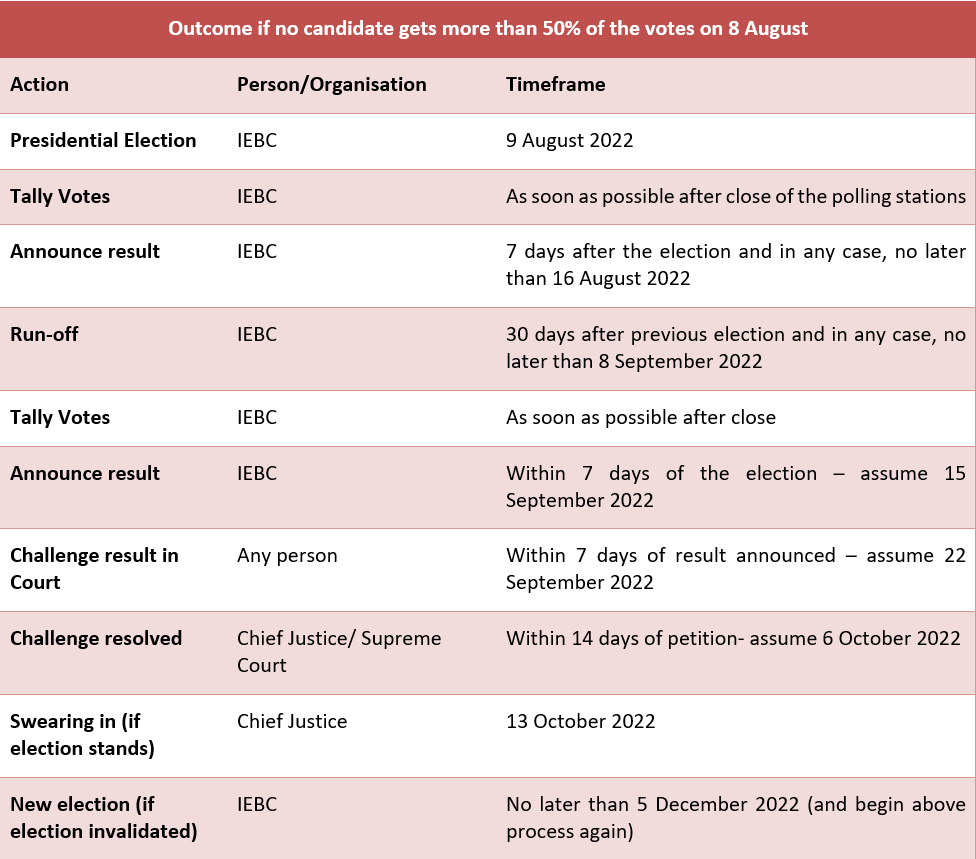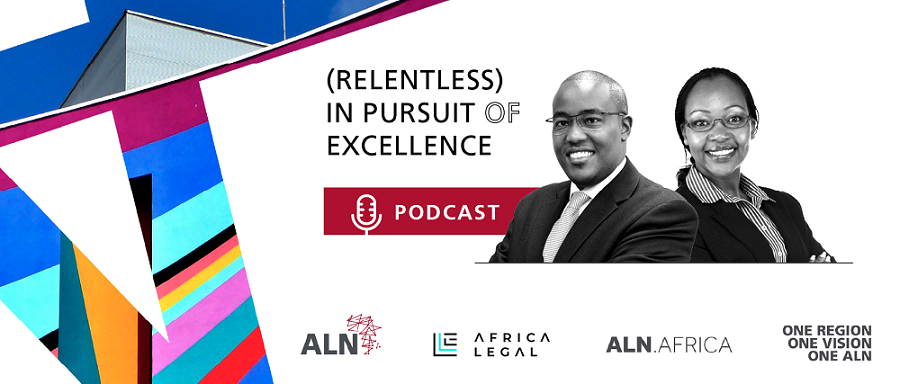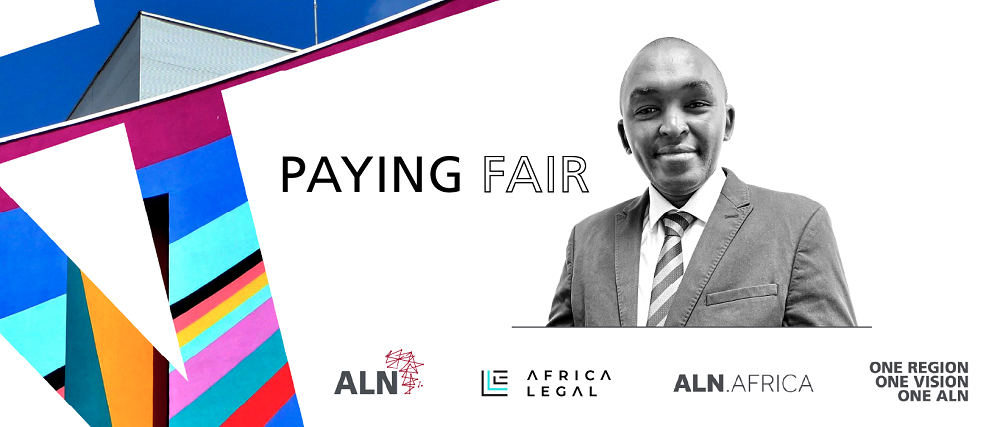ALN has for the third consecutive year received the “Africa Legal Network of the Year” award at the IFLR Africa Awards 2022, in recognition of its innovative approach in cross-border transactions. ALN member firms ALN Mauritius|BLC Robert & Associates, ALN Kenya|Anjarwalla & Khanna, and ALN Tanzania| A&K Tanzania won the “Law Firm of the Year” award for their impressive track records in providing advice on the most consequential and innovative deals in their respective countries.
News type: News
Announcements, Press Release
Relentless in Pursuit of Excellence
ALN Kenya | Anjarwalla & Khanna has cemented its position as a leading full-service law firm in Africa. In this podcast, co-managing partners Rosa Nduati-Mutero and Daniel Ngumy speak to Tom Pearson about the changes that have taken place in the firm and the ALN alliance.
Aluko & Oyebode admits Oluwatosin Iyayi and Ngo-Martins Okonmah into the Firm’s Partnership
The Partners of Aluko & Oyebode are pleased to announce the admission of Oluwatosin Iyayi and Ngo-Martins Okonmah into the Firm’s Partnership, effective 1 August 2022.
Election Series: Kenya’s Presidential Election Step-by-Step Process
On Tuesday, 9 August 2022, Kenya’s general elections will be held where all the elected seats are contestable. With Kenya’s trend-setting judicial intervention in the 2017 election causing confusion about the process, steps and timings that can be expected, this article discusses the presidential election process, as well as timelines and steps under different scenarios.
The Laws Applicable
In Kenya the laws that govern the election process are the Constitution of Kenya, 2010 (the Constitution), the Elections Act, Act 24 of 2011 (Elections Act) and the Assumption of the Office of President Act, Act 21 of 2012 (the Act).
Declaration of a Presidential Election Candidate as President
A candidate shall be elected as President if they receive:
(a) more than half of all the votes cast in the election (commonly referred to as the 50%+1 rule (fifty per cent of votes will be determined on the valid votes cast and will not include spoilt votes); and
(b) at least twenty-five per cent of the votes cast more than half of the counties (i.e. twenty four (24) counties).
When a Run-Off Takes Place
If no presidential candidate meets the statutory threshold, then a fresh election will take place within thirty (30) days of the previous election (the run-off). In the context of this election cycle, the run-off must occur prior to 8 September.
Tally of the Votes Cast in the Presidential Election
Under the Elections Act, the Independent Electoral and Boundaries Commission (IEBC) is required to electronically transmit and physically deliver the tabulated results of the presidential election from each polling station to the constituency and national tallying centres immediately polls close. They must also tally and verify the results and publish the polling result forms on an online portal which they are required by law to maintain.
The chairperson of IEBC is statutorily bound to declare the result of the election and deliver a written notification of the result to the Chief Justice and the incumbent President, within seven (7) days after the presidential election (this is no later than 16 August or 15 September for a run-off).
Where the IEBC is yet to receive results from all the constituencies but is of the opinion that the pending results would not make a difference with regard to the winner of the election, the law permits the chairperson to declare a winner.
Questions as to the Validity of the Presidential Election
Any person may file a petition in the Supreme Court to challenge the election of the President-elect within seven (7) days after the date of the declaration of the results of the presidential election.
The Supreme Court is required to hear and make a final determination of the petition within fourteen (14) days and no further right of appeal is available to any party. Assuming the IEBC declares a winner on 16 August and the runner up in this year’s election files a petition on the last possible day, that is, 23 August, the Supreme Court would render its decision by 6 September.
If the Supreme Court annuls the election of the President-elect, a fresh election must be held within sixty (60) days after the determination. If the determination were to be made on 6 September, the IEBC would have up to 5 November to conduct the fresh elections.
Swearing In Process
The swearing in of the Present-elect must be in public before the Chief Justice or in the absence of the Chief Justice, the Deputy Chief Justice.
The President-elect is required to be sworn in on the first Tuesday following:
a) the fourteenth (14th) day after the date of the declaration of the result of the presidential election, if no presidential election petition has been filed under Article 140 of the Constitution (assuming the declaration is made on 16 August, this would fall on 30 August); or
b) the seventh (7th) day following the date on which the court renders a decision declaring the election valid, if any petition has been filed under Article 140 of the Constitution (assuming the Supreme Court delivers its judgment on 6 September, this would fall on 13 September).
The Swearing in Ceremony Can Only Take Place between 10:00 a.m. and 2:00 p.m.
The President-elect takes office upon swearing an oath or making an affirmation of office, signing the certificate of inauguration and receiving the instruments of power from the outgoing President.
ALN Kenya looks forward to a peaceful and fair election and hopes that the winner, whomever that may be, oversees an inclusive and transparent government.
Summary Of Timeline

If no petition challenging the presidential election is filed, the swearing in will be on 30 August 2022.

Should you have any questions on this article, please do not hesitate to contact Karim S. Anjarwalla. Karim is a Senior Partner at ALN Kenya, which is generally considered the leading corporate law firm in Kenya and is the largest full-service corporate law firm in East Africa.
______________
Contributor
- Abdulmalik Sugow, Trainee Lawyer
- Fenan Estifanos, Trainee Lawyer
Stories that Matter | July
Africa
AfDB Ranked Most Transparent Organisation Globally
Publish What You Fund, the global campaign for aid and development transparency, has named the African Development Bank (AfDB) the most transparent organisation in the world. Released recently with a top score of 98.5 out of 100, the Bank’s sovereign portfolio now ranks first out of 50 global development institutions in Publish What You Fund’s 2022 Aid Transparency Index. Reacting to the top ranking, elated President of AfDB, Dr. Akinwumi Adesina, attributed the recognition to the relentless efforts of the more than 2,000 personnel across its organisation, whom he said works tirelessly to accelerate Africa’s progress. He said they consistently deliver top quality under the highest levels of scrutiny.
Source: The Guardian
East Africa
East African GDP jumps to USD 245 Billion after DRC Joins Bloc
The Democratic Republic of Congo recently completed the last and most important step of joining the East African Community (EAC). At a function held at the EAC headquarters in Arusha, Tanzania, on Monday, the DRC officially became a member of the EAC after depositing instruments of ratification on the accession of the EAC Treaty with the bloc’s secretariat. DRC now has full rights and privileges like any EAC member to participate in EAC’s programmes and activities and affirms to meet the obligations of the EAC. With a population of about 92 million people, it holds almost half of the population of the EAC member states and is thus a huge market. The entry of DRC portends growth in various sectors, and also increases the population to above 300 million. The combined gross domestic product (GDP) will also rise to USD 250 billion. The DRC’s entry is expected to remove restrictions on the free movement of people and goods and increase intra-EAC exports to the DRC, which currently stand at USD 7.4 billion.
Source: Business Daily
Kenya
Over 4 Million Kenyans Own Crypto, Highest Share in Africa
Kenya has the largest share of its population with cryptocurrencies in Africa, says the United Nations, pointing to the country’s exposure to the ongoing meltdown in the crypto market. A report by United Nations Conference on Trade and Development (UNCTAD) says that 8.5 percent of the population or 4.25 million people own cryptocurrencies in the country. This places Kenya ahead of developed economies such as the United States, which is ranked sixth with 8.3 percent of its population owning digital currencies. War-torn Ukraine is ranked top, with 12.7 percent share of its population with cryptocurrencies, followed by Russia (11.9 percent), Venezuela (10.3 percent) and Singapore (9.4 percent). This has hit the estimated four million Kenyans, mainly young and small traders, who in recent years have flocked to cryptocurrencies in the hope of quick returns, despite warnings from regulators such as the Central Bank of Kenya that the emerging assets can be high-risk.
Source: Business Daily
Kenya
Kenya Seeks to Rival London, Dubai with New Financial Hub
Kenya will finally launch its international financial centre in the capital Nairobi today after years of preparation to attract large foreign firms and boost capital flows. The Kenyan hub is expected to model Nairobi as a financial district in line with existing financial centres in European, Middle East and the Far East capitals such as London, Dubai and Hong Kong. Despite Kenya’s relatively developed capital markets, 75 percent of all business financing in the economy was from the banking sector, while the balance came from the capital markets, the Treasury said earlier, adding that the situation was not ideal. The centre, which has been in the works since 2014, is meant to help direct international investment to Kenya, enabling companies and investors to take advantage of trade and investment opportunities. It aims to raise more than USD 2 billion in investments by 2030.
Source: Business Daily
Nigeria
Government Targets USD 39 Billion from Public-Private Partnerships in Two Years
The federal government is hoping to generate about USD 39 billion from privatisation of public institutions between 2021 and 2022, the acting director-general of the Infrastructure Concession Regulatory Commission (ICRC), Michael Ohiani has said. The ICRC boss, who disclosed this on Monday, 4 July, in Abuja, at the opening of a two-day summit of the Africa Public-Private Partnership (PPP) Network, hinted that in 2021, the ICRC published a pipeline of 51 eligible and bankable PPP projects, worth over USD 17 billion. According to him, the list contained the projects from different economic sectors which have been granted the Outline Business Case Compliance Certificates, but which did not have identified bidders. He added that for 2022, ICRC intends to gazette a pipeline of 53 eligible and bankable PPP projects, worth about USD 22 billion, very soon. These bring the total sum of the proposed bankable projects to USD 39 billion. He further stressed that as of May 2022, there are 77 post-contract PPP projects under implementation at the ICRC Projects Disclosure Portal, which is the first disclosure portal in the world, established in collaboration with the World Bank.
Source: The Guardian
Nigeria
Nigeria Secures Lion’s Share of USD 65 Billion World Bank Funding
The federal government of Nigeria, recently, secured the biggest share of the USD 65 billion (approx. NGN 27 trillion) funding from the World Bank’s International Development Association to African countries. This was as the international organisation unveiled the 20th replenishment package, IDA-20, in Dakar, the Senegalese capital, to help low-income countries respond to the COVID-19 crisis and build more resilient economies. According to a statement signed by the Senior Special Assistant to the President on Media and Publicity, Garba Shehu, 70 per cent (USD 65 billion) of the entire package which amounted to USD 93 billion (approx. NGN 38 trillion), will be channelled to various African states with the largest share being allocated to Nigeria. The statement is titled ‘At Dakar summit, Nigeria gets a big slice of IDA financial package’. The President, Major General Muhammadu Buhari (retd.), who joined other African leaders in Dakar, said the “largest financial package ever mobilised in the history of the IDA” will prioritise some key areas such as: agriculture and food security, human capital, climate change adaptation, bridging the gender gap, job creation, digital and technological innovation, among others.”
Source: The Punch
South Africa
Construction Begins on One of the World’s Largest Solar and Battery Facilities
Norwegian renewable energy firm Scatec ASA has started construction of the three Kenhardt projects in the Northern Cape Province of South Africa. Scatec can now begin project construction after reaching financial close under South Africa’s renewable development programme, the Risk Mitigation Independent Power Producer Procurement Programme (RMIPPPP). Once operational, the project will have a total solar capacity of 540MW and battery storage capacity of 225MW/1,140MWh. It will provide 150MW of dispatchable power under a 20-year Power Purchase Agreement to the Kenhardt region.
“This project is a first of its kind and will be one of the world’s largest solar and battery facilities. We are now looking forward to starting construction of this unique and exciting project, which will be a major contribution to South Africa’s economy and green energy sector,” says Scatec CEO Terje Pilskog. The project will be the largest investment in Scatec’s history with a total capex of approximately ZAR 16.4 billion (USD 962 million).
Source: Power Engineering International
Tanzania
Tanzania Signs USD 3 Billion Deal for Southern Africa’s Largest Industrial Park Project Vice President Dr Philip Mpango has witnessed the signing of the Memorandum of Understanding (MoU) for the execution of the Sino Industrial Park project worth USD 3 billion (approx. TZS 6.94 trillion). The project will become the largest industrial park in the southern part of Africa. The deal was signed on Wednesday afternoon during the closure of the 46th Dar es Salaam International Trade Fair held at Sabasaba grounds in Tanzania’s business capital. The discussions for the multi-billion project were facilitated by Tanzania Trade Development Authority (Tan Trade)’s under sellers and buyers forum held in the city. Elaborating more on the deal, the Permanent Secretary in the Ministry of Trade, Industry and Investment, Prof Godius Kahyarara said the biggest industrial park in the Sub-Saharan region will provide approximately 100,000 direct employment opportunities while other 300,000-400,000 vacancies will be generated indirectly.
Source: All Africa
Reports
Global Economic Prospects | World Economic Forum
Just over two years after COVID-19 caused the deepest global recession since World War II, the world economy is again in danger. This time it is facing high inflation and slow growth at the same time. Even if a global recession is averted, the pain of stagflation could persist for several years— unless major supply increases are set in motion. Amid the war in Ukraine, surging inflation, and rising interest rates, global economic growth is expected to slump in 2022. Several years of above-average inflation and below-average growth are now likely, with potentially destabilizing consequences for low- and middle-income economies. It’s a phenomenon—stagflation—that the world has not seen since the 1970s.
The forecasts reflect a sizable downgrade to the outlook: global growth is expected to slow sharply from 5.7 percent in 2021 to 2.9 percent this year. This also reflects a nearly one-third cut to theJanuary 2022 forecast for this year of 4.1 percent. The surge in energy and food prices, along with the supply and trade disruptions triggered by the war in Ukraine and the necessary interest rate normalization now underway, account for most of the downgrade.
Click here to download the report.
Chief Economist Outlook | World Economic Forum
The May 2022 Chief Economists Outlook comes out amid extremely high uncertainty about geopolitical developments, the trajectory of the global economy and the next steps for economic policy. Instead of entering a post-COVID recovery phase, economies are experiencing additional shocks, first and foremost from the war in Ukraine and associated geopolitical repercussions, but also from new outbreaks of COVID-19 and lockdowns in major industrial centres. Beyond the immediate humanitarian impact of the conflict and the ongoing health consequences of the pandemic, this has meant downward revisions to growth prospects and exacerbated inflationary pressures from disruptions to commodities and food supplies. Oil and gas price shocks are complicating the balance between energy security and the transition to greener energy sources, while rising food and commodity prices are threatening lives and affecting the cost of living across the world. Concerns over debt sustainability, capital flight and currency depreciation in low- and middle-income countries are on the rise as monetary policy in major economies is tightened.
Click here to download the report.
Renewable Energy Market Analysis | IRENA
Africa is at a crossroads. For many of the people of this vast and diverse continent, access to affordable, clean and sustainable energy remains an aspiration. The need for better and more abundant energy is evident in many walks of life, from households relying on dirty fuels for cooking and farmers lacking energy to harvest their crops, and from health clinics struggling to power operating rooms to businesses contending with power outages. Climate change is fast adding new challenges in the form of extreme weather events, rising temperatures and more variable rainfall. Renewable energy can help to resolve many of these social, economic, health and environmental challenges. Renewables are key to overcoming energy poverty, providing energy services without damaging human health or ecosystems, and enabling sustainable socio-economic development. As this report shows, a transition to a renewables-based energy system in Africa promises substantial gains in GDP, employment, and human welfare in each of the continent’s constitutive regions.
Click here to download the report.
The Global Covid-19 Fintech Market Impact and Industry Resilience Study | World Economic Forum
The Global COVID-19 Fintech Market Impact and Industry Resiliency Study provides insights into the medium-to-longer-term impact of the pandemic on the financial technology (fintech) industry. In this study, we gathered data on three key areas. This study follows on from The Global COVID-19 FinTech Market Rapid Assessment Study (from now on referred to as The Rapid Assessment Study), which focused on the short-term effects of COVID-19 on the fintech industry. This study has been jointly developed by the Cambridge Centre for Alternative Finance (CCAF) at the University of Cambridge Judge Business School, the World Bank Group (WBG), and the World Economic Forum (WEF).
Overall, the global fintech industry has been more resilient to the pandemic than initially reported in The Rapid Assessment Study, albeit with greater differences at the vertical and country level. Globally, all verticals grew at a faster pace than reported in our previous study, except data analytics. Retail-facing fintech platforms in this panel reported increases of 47 percent in gross values transacted from USD 358 billion in 2019 to USD 526 billion in 2020.
Enhancing Cybersecurity for Critical Business Infrastructure in Africa
As the world continues to recover from the disruptions of the COVID-19 pandemic and the Ukraine – Russia conflict, coping mechanisms such as increased use of virtual workspaces, online marketplaces and e-governance have become the norm. While this presents opportunities to revamp economies and streamline public service delivery, it may also heighten exposure to cybercrime.
According to a special report by Cybercrime Magazine, the global cost of cybercrime is expected to reach an estimated USD 6 trillion by the end of 2022 and USD 10.5 trillion by 2025. These estimates represent a significant leap in the frequency and scope of cybercrime which reached a record high of approximately USD 1 trillion in 2020. Out of the 2020 estimation, approximately USD 945 billion was lost due to cyber-attacks, and approximately USD 145 billion was spent on cyber security efforts. The increase in reported cybercrime has been attributed to various factors, including the increase in online activity which has resulted in increased reporting of incidents by governments and organisations.
Despite this trend, businesses have fallen behind in implementing robust cybersecurity measures. For instance, it is estimated that 20 percent of organisations worldwide do not have any cyber incident prevention plan in place. Similarly, a cybersecurity benchmarking study carried out in 2022 revealed that 41 percent of the polled executives were not confident that their security initiatives aligned with the current digital transformations. These vulnerabilities put organisations and their stakeholders at significant risk. Attacks on critical infrastructure, such as in the power, communications, financial, health and transportation sectors, are of particular concern given the impact that such disruptions can have on large segments of the population and the threat that they pose to national security.
In Africa, many countries have seen a rise in reports of digital threats and malicious cyber activities. The results include sabotaged public infrastructure, losses from digital fraud and illicit financial flows, and national security breaches involving espionage and intelligence theft by militant groups. Addressing these vulnerabilities requires a greater commitment to cybersecurity. This requires enforceable policy safeguards, risk prevention and management approaches, along with technologies and infrastructure that can protect each country’s cyber environment, as well as individual and corporate end-user assets. This, therefore, helps institutions, and public and private entities to mitigate risks associated with cybercrime and to enhance cybersecurity.
Africa’s digital transformation has made information much more valuable and many countries are in the process of ensuring that there are conducive legal and regulatory frameworks, in order to prevent information from being accessed illegally and without consent. In a bid to create these frameworks, governments are also aware that they should not underpin the growth of the digital space. For instance, a 2022 survey done by the Central Bank of Kenya reveals that 92 percent of banks and 86 percent of microfinance banks identified cyber-risks as one of the top three innovation-related risks. In a way, the world of cybersecurity is an evolving one as malicious individuals and organisations are constantly looking for improved ways of accessing data and information. It has been clear that the digital revolution has positively affected some industries more than others such as banking & finance, media & telecommunications and technology. Despite the positives, the risks are also quite significant.
Given the vulnerability of various industries to cybercrime, significant effort must go towards planning for the prevention of cyber-attacks and, where prevention is not possible, mitigating their effects when they do occur. Protecting critical infrastructures, such as power stations, transportation, telecommunications, financial services, and water supply is particularly important given the significant risk that any disruption poses. Below are some of the critical mitigating risk factors that should be put in place.
- Awareness
A critical step is to create awareness of how cyber-attacks may be perpetrated. The most frequent form of a cyber-attack on critical infrastructure globally has been through malware, including ransomware, which compromises internal systems disrupting their functionality. Additionally, these attacks cost countries significant losses especially if there is a disruption in power supply as a result. Therefore, governments and private entities must step up measures to educate the public on how these attacks may be carried out. - Training
It is important to train those who interact with the infrastructure on how they may prevent or mitigate cyber-attacks. Crucially, given the interconnectedness and interdependence of the supply chain systems, cybersecurity preparedness should take a collaborative approach. For instance, the banking and finance and telecommunications sectors in Africa have become interdependent and operate in the same ecosystem, especially because of mobile banking which is crucial for most businesses. - Design, Auditing and Monitoring
For new systems being developed, ‘resilience by design’ should be considered, which includes cybersecurity as a parameter in the design of the infrastructure. This will reduce the chances of an attack taking place. To ensure that the critical infrastructure is secure enough, an audit ought to be undertaken to identify any faults or improvements that may need to be made. Furthermore, several tools exist which constantly monitor relevant threats by identifying indicators of compromise affecting technological systems on a real-time basis. - Risk Management Plan
A plan in the form of a risk management manual should be laid down. This plan should require the infrastructure and related systems to be evaluated frequently. In the event of a cyber-attack, it is important to have a team that is well versed in crisis management in the context of cybersecurity. This requires having the people with the right skills to quickly enable the affected organisation to identify the root causes of the cyber-attack, address the problem and move on from the situation better prepared to mitigate such risks in the future.
As Africa continues to grow in leaps and bounds within the digital space, vigilance should be a guiding principle. Governments should ensure that they are able to invest in cybersecurity and monitor malicious activity without invading the privacy of their citizens. To ensure that they can achieve all this comprehensively, they must involve the public in the decisions they make as well as come up with legislative changes that can be enforced in incidents of cyber-attacks.
Business Daily | Cybersecurity Ventures | ITU | The East African
ALN Tanzania | Handling Sophisticated Transactions Across Borders
Most businesses that engage in commerce with their customers don’t usually give any thought to the legal side of it. Understanding the economic law can benefit your business greatly and can play a vital role in its success. The most important part of commercial law is that it helps businesses resolve conflicts and disputes.
Corporate commercial laws make it easy for your business to make cross-border transactions. Featuring for The Enterprise World’s this issue of The Most Innovative Law Firms to Watch is A&K Tanzania, a law firm with expertise in corporate commercial and various fields.
Rooting Out Plastic
“Our goal as a firm is to have an impact on the environment by reducing the effects of single-use plastic and to educate current and future generations in Africa and beyond,” said Rosa Nduati-Mutero, a partner in A&K’s Corporate department.
Paying Fair
“We are living through an unprecedented period in the tax world. We are experiencing a massive effort on tax transparency and international cooperation since the “fork in the road” of the global financial crisis in 2008,” says tax law expert James Karanja of ALN Kenya | Anjarwalla & Khanna.
“There’s a huge focus now on multinational enterprises as a major source of tax revenue for governments,” says Karanja, who spent 15 years at the Kenya Revenue Authority and led the OECD-UNDP Tax Inspectors Without Borders programme building capacity for developing countries’ tax administrations on tax audit and transfer pricing issues. “You had companies with massive stashes of untaxed cash when governments were starving for that cash, so there was a big movement from the global community including G20, the OECD, and the United Nations to remedy that”.
Resulting changes at policy and regulatory levels flowed throughout the world, he adds, and within East Africa can be seen in the Finance Bills in Kenya and reforms in Uganda and Rwanda designed to tackle tax avoidance by multinational corporations who were not seeming to pay their fair share of tax.
“But certainly one of the things we want to be conscious of is that while governments are keen to recover money from multinationals, we must also ensure they do so in an even-handed way,” says Karanja, recently appointed as ALN Kenya’s Tax Associate Director in charge of Transfer Pricing Services.
James tells Africa Legal that as a transfer pricing expert he’s thrilled to be joining ALN Kenya, as the firm enjoys a strong record for cross-border and digital tax matters.
“They are best in class, a really trusted provider for a huge number of clients in Africa, handling some of the highest value legal work in the African market,” he says. “It’s an exciting opportunity for me to bring my rich local and global experience in international tax to assist clients within Africa and to help build a dedicated international practice.”
With the East African market, and particularly Kenya, now one of the leading FDI attractions for companies, Karanja says it’s vital for businesses to get the best advice on international tax and transfer pricing compliance.
“There’s clearly high returns and good profit potential, however challenges remain, particularly in the regulatory environment,” says Karanja, noting the issue of fiscal certainty, with governments at times wanting to rapidly change their tax regime, affecting companies’ long-term planning and the treatment and interpretation of their business dealings.
Karanja and his colleagues want to help companies operate better and improve how they engage with the tax administrations to get a fair look at issues and better certainty. “But clearly the profit potential and opportunities in this market are growing as time goes on.”
With tax law traditionally being “a sovereign jurisdictional issue”, even as governments have given up some sovereignty for enhanced international cooperation, it is important that multinationals stay compliant across jurisdictions as business becomes more borderless.
“Companies should be looking for a partner such as ALN Kenya that has a footprint across a wide number of countries, so they get better support from a one-stop platform,” says Karanja.” “We have a great opportunity to support a lot more companies that are looking to operate in different jurisdictions within the African market.”
This article was first published by Africa Legal.
New Associate Director Strengthens ALN Kenya’s Tax Bench Strength
ALN Kenya | Anjarwalla & Khanna is delighted to announce the appointment of James Karanja as Tax Associate Director in charge of Transfer Pricing Services based in Nairobi, Kenya. As global challenges continue to frame new changes to the international and digital tax regulatory framework, James’ appointment is designed to strengthen the Firm’s response to its client service needs.
The appointment further reaffirms our approach on how we view new opportunities, as we continue to help unlock value for our clients investing across Africa. James joins a team led by Managing Partner and Head of Tax Daniel Ngumy and Partner Kenneth Njuguna. He will continue to strengthen the Firm’s significant tax offering in East Africa.
James has over 22 years’ experience in international tax issues, having worked with the Kenya Revenue Authority (KRA) and Organisation for Economic Co-operation and Development’s (OECD) Tax Inspectors without Borders (TIWB) Project. Prior to joining ALN Kenya, he had served as the Head of Transfer Pricing at Andersen Tax in Nairobi.
James is the immediate former Head of Secretariat of the TIWB where he was responsible for developing TIWB into a highly visible, well-funded and successful global transfer pricing capacity building project of the OECD and UNDP. This initiative focused on building skills for tax administrations in developing countries. As Head of TIWB, James worked with senior revenue officials across the African continent and is therefore well known and well regarded by revenue authorities across Africa.
During his tenure at KRA, James worked extensively on international tax issues including transfer pricing audits, investigations and legislative reforms and was responsible for leading the Africa tax Administration Forum Committee of African transfer pricing experts to Africa’s contributions to the OECD-G20 Base Erosion and Profit Shifting (BEPS). In recognition of the successful interventions, James assisted the OECD Secretariat in formulation of the design of the Inclusive Framework on BEPS to allow for broader participation of developing countries in the tax reform process.
“The global tax environment is quickly changing, with greater focus on international arrangements, and cross-border tax matters such as transfer pricing,” says ALN Kenya Managing Partner and Head of Tax, Daniel Ngumy. “The appointment of James not only reflects his professional expertise and commitment to our ALN values towards bolstering our quality of service and know-how front, but also highlights our unwavering commitment to continue supporting clients navigate emerging tax issues new territories and capitalise on future opportunities in the East African region and across Africa.”
James has also served as the Kenya representative to the OECD Committee on Fiscal Affairs, as well as a member of OECD’s working party on Tax Treaties and related issues. James is also well versed with exchange of information for tax purposes issues having served as a Global Forum on Transparency peer reviews assessor and led Kenya’s Phase 1 and 2 Peer reviews in addition to representing Kenya in the Global Forum’s Steering Group.
ALN Kenya Co-Managing Partner Rosa Nduati-Mutero has referred to the appointment as “further evidence of our meritocratic culture, our strong belief in the future of the firm and ALN, and in the individual strength of our outstanding professionals and colleagues. In this constantly evolving sector, James adds to the tax team’s insightful and forward-thinking perspective which is crucial to solving our clients legal tax challenges.”
In 2017, James was named among the International Tax Review’s Global Tax 50 which lists of the most influential individuals, organisations, geopolitical events, and trends in the tax world. He has also participated as an accomplished speaker at numerous international tax meetings and conferences. James is an outgoing Associate of a Pan African initiative dubbed the Illicit Financial Flows joint programme and remains passionate about championing issues of Africa’s economic development.
James is an Advocate of the High Court and a member of the Law Society in Kenya. He also holds a Master of Public Policy and Management (MPPM) from Strathmore University, Bachelor of Law (LLB) from University of Nairobi.
James will be involved in working with our clients in the preparation of transfer pricing documentation across Africa. James will also be involved in defending clients against the increasingly significant transfer pricing assessments raised by revenue authorities on multinational companies and investors operating across Africa.
“I am very excited to join Anjarwalla & Khanna, and ALN, which enjoys a strong record for cross-border and digital tax matters. I hope to bring my experience to assist clients across Africa with their transfer pricing needs, and to help build a dedicated international practice in my client engagements. Going forward, I see us as the tax team that everyone wants to work with and be part of, and the trusted tax adviser of choice in the region,” says Tax Associate Director James on his joining the team.
Speaking on James’ appointment to ALN’s growing cross border tax team, ALN Kenya Senior Partner and ALN Board Director Karim Anjarwalla comments: “As an experienced tax expert, James will add bench strength and depth, further bolstering the establishment of a dedicated international tax team which will be a game changer for our East African region and the continent at large.”
Please join us in welcoming James to the ALN family and wishing him the best of luck in his new role as he takes this significant step towards further excellence.
We are One Region. One Vision. One ALN.









